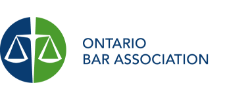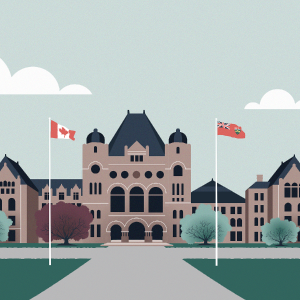Introduction
The Ontario Bar Association (“OBA”) provides comments on proposed regulations that would operationalize recent amendments to the Child, Youth and Family Services Act, 2017 (CYFSA), regarding the publication of information that would identify individuals as having been the subject of child protection proceedings.
Ontario Bar Association
Established in 1907, the OBA is the largest and most diverse volunteer lawyer association in Ontario, with close to 16,000 members, practicing in every area of law in every region of the province. Each year, through the work of our 40 practice sections, the OBA provides advice to assist legislators and other key decision-makers in the interests of both the profession and the public and we deliver over 325 in-person and online professional development programs to an audience of over 20,000 lawyers, judges, students, and professors.
This submission was developed by the OBA’s Child and Youth Law Section and reviewed by the Family Law and Privacy and Access to Information Sections. Members of these sections work in private practice, government agencies, and not-for-profit organizations, with many representing parents and children in the areas of child protection law and youth justice.
Comments & Recommendations
Amendments to O. Reg 155/18
The proposed amendments to O. Reg 155/18 would establish criteria for an individual to publish, or cause to be published, information that would identify themselves as having been the subject of a child protection proceeding. If enacted, these amendments would operationalize section 87 (8.1) of the CYFSA, which is not yet in force.
In principle, the OBA supports the proposed change and agrees that it would allow individuals to have greater agency over their own stories and lived experiences. The criteria proposed by the Ministry appears to strike a reasonable balance between respecting individual autonomy and maintaining the continued protection of other identities involved in these proceedings. However, in doing so, it is important to recognize that individuals who identify themselves as having been involved in such proceedings may, by implication, also identify the involvement of their parents or siblings. This raises secondary privacy considerations that should be carefully considered before implementing the proposed amendments.
Moreover, there is additional concern about the substantive equality implications that could arise if these amendments proceed without corresponding changes to related disclosure frameworks. On the one hand, the proposed amendments would permit individuals to publicly share their own child protection experiences. On the other hand, without parallel changes to O. Reg 158/18 Adoption Information Disclosure, adoptees, particularly those whose adoptions have broken down, would remain restricted from accessing or sharing comparable information about their own histories.
In its current form, section 227 of the CYFSA establishes a general prohibition on disclosure of confidential adoption records, subject to specific exceptions, including as authorized by the Act or regulations. O. Reg 158/18 sets out explicit circumstances in which the disclosure of certain identifying or non-identifying information is authorized. A child under eighteen can, with their adoptive parents’ consent, obtain non-identifying information about their history, including the date of adoption, background information relating to their birth parents, birth grandparents, some information about the circumstances leading to their adoption, and their birth family’s social history.
If O. Reg 158/18 remains unchanged, these narrow exceptions will act as an impediment to the intentions of the proposed amendments to O. Reg 155/18, creating an inequitable system in which youth in child protection proceedings are empowered to speak openly about their experiences whereas adoptees remain subject to a legislative regime that continues to shroud adoption in secrecy and blocks them from telling their stories about their experiences in the child welfare system. Importantly, such an approach is increasingly misaligned with contemporary values emphasizing the benefit of openness to children who are placed for adoption and the uniquity of social media and its use to find and connect with birth family members.
For instance, older youth who experience an adoption breakdown are some of the most vulnerable youths in the province. These individuals often seek access to records and information to better understand and share their experience in the child welfare system. It would be patently unfair to deny adoptees the ability to access or share information about their own experiences solely on the basis of a failed adoption or continue to require the consent of their adoptive parents to access information when they may have returned to care and no longer have a relationship with their adoptive parents.
Accordingly, the OBA urges the Minister to consider parallel amendments to O. Reg 158/18 to ensure adopted individuals are also afforded with the right/opportunity to access and publish information about their child protection experiences, and in doing so, equally achieve the intentions of the proposed O. Reg 155/18 amendments. We submit that there are at least two necessary changes to O. Reg 158/18 to achieve the equitable system for which we are advocating. The requirement for adoptive parents to consent to an adoptee under the age of eighteen obtaining information about their history should be eliminated. In addition, the exception to s. 227 should be added to O. Reg 158/18 to permit minor adoptees the ability to obtain and disclose information in the way the Minister intends for individuals who have gone through the child welfare system but were not adopted.










